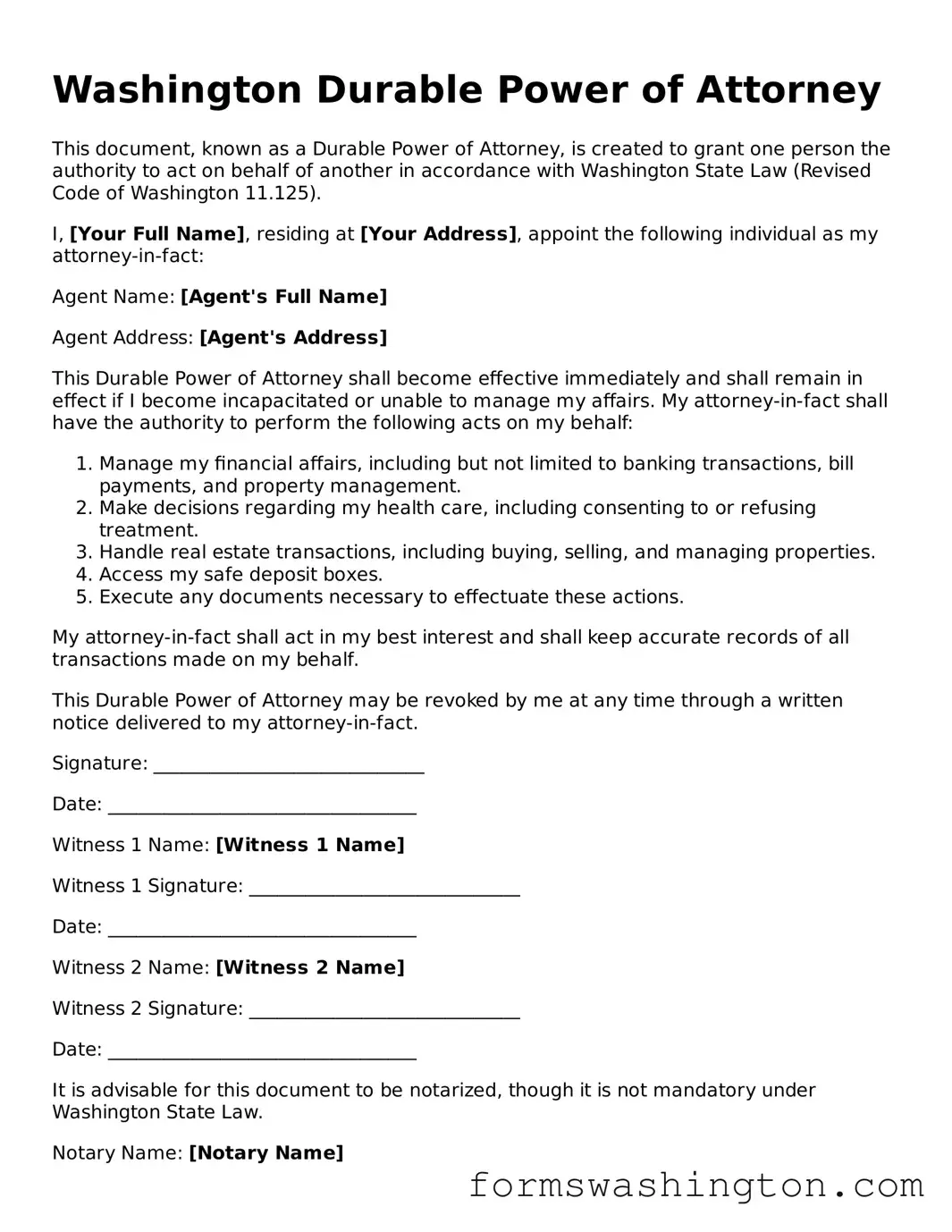Blank Durable Power of Attorney Template for Washington State
The Washington Durable Power of Attorney form serves as a crucial legal document that empowers individuals to designate a trusted person to manage their financial and legal affairs in the event they become incapacitated. This form allows the appointed agent to make decisions on behalf of the principal, covering a wide range of responsibilities, including handling bank transactions, managing investments, and overseeing property transactions. It remains effective even if the principal becomes mentally or physically unable to make decisions, ensuring continuity in management of their affairs. The form must be signed by the principal and witnessed or notarized to be valid, emphasizing the importance of proper execution. Moreover, it can be tailored to specify the powers granted to the agent, allowing individuals to maintain control over their personal and financial matters. Understanding the nuances of this form is essential for anyone considering this important step in their estate planning process.
Documents used along the form
A Washington Durable Power of Attorney form is a crucial document that allows an individual to designate someone else to manage their financial and legal affairs. However, there are other forms and documents that often accompany this form to ensure comprehensive planning and protection. Below are some commonly used documents.
- Advance Healthcare Directive: This document allows individuals to specify their healthcare preferences in case they become unable to communicate their wishes. It can include instructions about medical treatments and appoint a healthcare proxy.
- Living Will: A living will outlines an individual's wishes regarding end-of-life medical care. It provides guidance to healthcare providers and family members about the types of medical interventions desired or refused.
- Will: A will is a legal document that outlines how a person's assets should be distributed upon their death. It can also designate guardians for minor children and appoint an executor to manage the estate.
- Trust: A trust is a legal arrangement that allows a person to transfer assets to a trustee, who manages those assets on behalf of beneficiaries. Trusts can help avoid probate and provide tax benefits.
Utilizing these documents in conjunction with the Durable Power of Attorney can provide a more complete approach to managing personal and financial affairs. It is important to consider each document's role in your overall estate planning strategy.
Misconceptions
Here are seven common misconceptions about the Washington Durable Power of Attorney form:
- It only applies to financial matters. Many people believe that a Durable Power of Attorney (DPOA) can only be used for financial decisions. However, it can also cover health care decisions if specified in the document.
- It is only valid if the person is incapacitated. A DPOA is effective as soon as it is signed, unless it states otherwise. It does not require the principal to be incapacitated to be valid.
- Once created, it cannot be changed. This is not true. The principal can revoke or amend the DPOA at any time as long as they are still mentally competent.
- All powers are granted automatically. The powers granted in a DPOA must be clearly outlined in the document. If a specific power is not mentioned, the agent does not have that authority.
- It is the same as a regular Power of Attorney. A Durable Power of Attorney remains effective even if the principal becomes incapacitated, while a regular Power of Attorney does not.
- Only lawyers can create a Durable Power of Attorney. While it is advisable to consult with a lawyer, individuals can create a DPOA using templates or forms available online, as long as they meet legal requirements.
- It expires after a certain time. A Durable Power of Attorney does not have an expiration date unless specified in the document. It remains in effect until revoked by the principal or upon their death.
Check out Some Other Templates for Washington
Washington State Odometer Disclosure - This form saves you from having to handle vehicle transactions directly when you are unavailable.
Washington State Lease Agreement - Having a written agreement can avoid misunderstandings later on.
Washington State Llc Operating Agreement - This document can help you avoid conflicts by setting clear expectations.
Dos and Don'ts
When filling out the Washington Durable Power of Attorney form, it is important to approach the task with care. Here are some essential do's and don'ts to keep in mind.
- Do read the entire form carefully before starting to fill it out.
- Do clearly identify the person you are appointing as your attorney-in-fact.
- Do specify the powers you are granting, being as detailed as possible.
- Do sign the form in front of a notary public to ensure its validity.
- Don't leave any blank spaces on the form; fill them in or mark them as "N/A."
- Don't forget to discuss your wishes with your attorney-in-fact before completing the form.
Following these guidelines can help ensure that your Durable Power of Attorney is completed correctly and reflects your intentions. It is always wise to seek assistance if you have questions or concerns.
